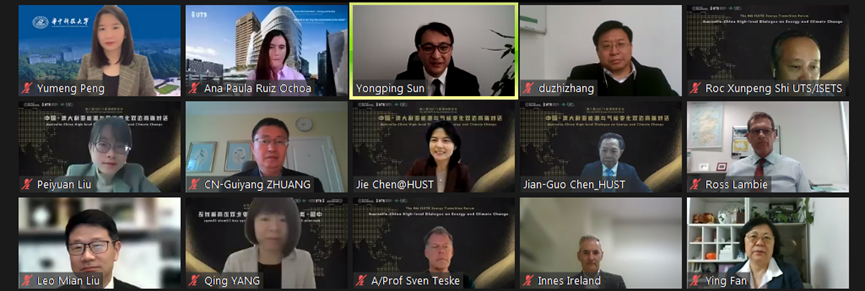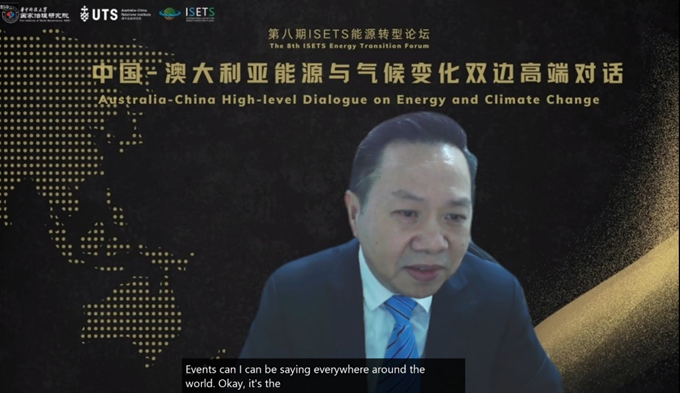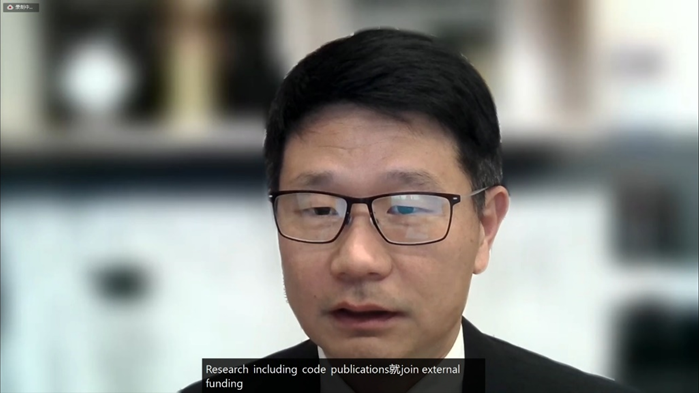The 8th International Symposium on Energy Technology and Strategy (ISETS), and the Australia-China High-level Dialogue on Energy and Climate Change were co-hosted on Dec 14th by the Institute of State Governance of HUST, the Australia-China Relations Institute of University of Technology Sydney (UTS) and the International Society for Energy Transition Studies. Chen Jianguo, Vice President of HUST and Leo Mian Liu, Vice President of UTS attended and delivered speeches at the opening ceremony. Over 10 experts and scholars from both Australia and China presented their reports at the conference, and more than 1,500 audience participated in the event in person or virtually.

Chen Jianguo addressed the meeting, noting that with climate change being one major challenge for humans and energy transition being a core move to tackle it, the Chinese and Australian governments have proved their determination to achieve climate goals. “In this context, the dialogue between HUST and UTS couldn’t be more relevant,” said Chen.

In his speech, Leo Mian Liu emphasized on the essential role higher institutions could play in delivering climate solutions, and urged global cooperation and in-depth reforms within and among universities to facilitate research networks and cross-disciplinary knowledge sharing.

Following the speeches were reports from 8 scholars. Zhuang Guiyang, Deputy Director of the Research Institute for Eco-civilization of CASS, introduced China’s carbon peaking and neutrality strategies and urban cities’ leading role in achieving the goals. Balance between the environment and the economy is the overarching principle, said he.
Ross Lambie, Chief Economist of the Minerals Council of Australia, presented his report “Crises and Challenges when Pursuing Net-zero Emissions in the Mining Industry”. In his report, he introduced the material restrictions and impacts that the mining industry has been imposed on during the transition from a fuel-driven energy system to a material-driven one.
Professor Fan Ying, Dean of the School of Economics and Management of Beihang University, spoke under the theme “Efficiency and Social Welfare of a Volume and Intensity-based Carbon Emission Trading Market”, and concluded that higher efficiency and social welfare could be achieved in an intensity-based trading system.
Associate Professor Emma Aisbett, Deputy Director of the Zero-Carbon Energy for the Asia-Pacific project, made a presentation regarding the international green economic cooperation. She said such cooperation could enhance the cross-border flow of the supply chain and promote economic growth, but it’s still necessary to keep a close watch on the market failure of green goods.
Professor Sun Yongping, Deputy Dean of the Institute of State Governance of HUST, reported on the institutional design of China’s carbon trading market by introducing the design principles, challenges and the institutional innovation of Hubei’s carbon trading pilot market. He pointed out that though faced with completely different challenges compared to the developed countries, China is the only developing country which has established the world’s largest carbon trading market.
Associate Professor Sven Teske, Director of the Institute for Sustainable Futures of UTS, made a report under the title “Paths to Net-Zero Emissions”, and analyzed the different paths to reduce emissions for each individual sector.
Professor Yang Qing, Director of China-EU Energy Finance Research Institute at HUST, presented her report “Carbon Negative Technological Options for China to Achieve Carbon Neutrality—Biochar and Biofuels”, noting that the timing of applying carbon negative technology matters.
After giving his presentation about opportunities for Australia-China cooperation on energy and climate change, Chief Researcher Shi Xunpeng of the Australia-China Relations Institute of UTS presided over the closing ceremony. The experts and scholars at both sides expressed their hope that the dialogue should be held in the following years to help reach more consensuses at academic and policy levels.
Written by: Qin Wei
Edited by: Ye Jingyi, Jiang Jing
Source: The Institute of State Governance
